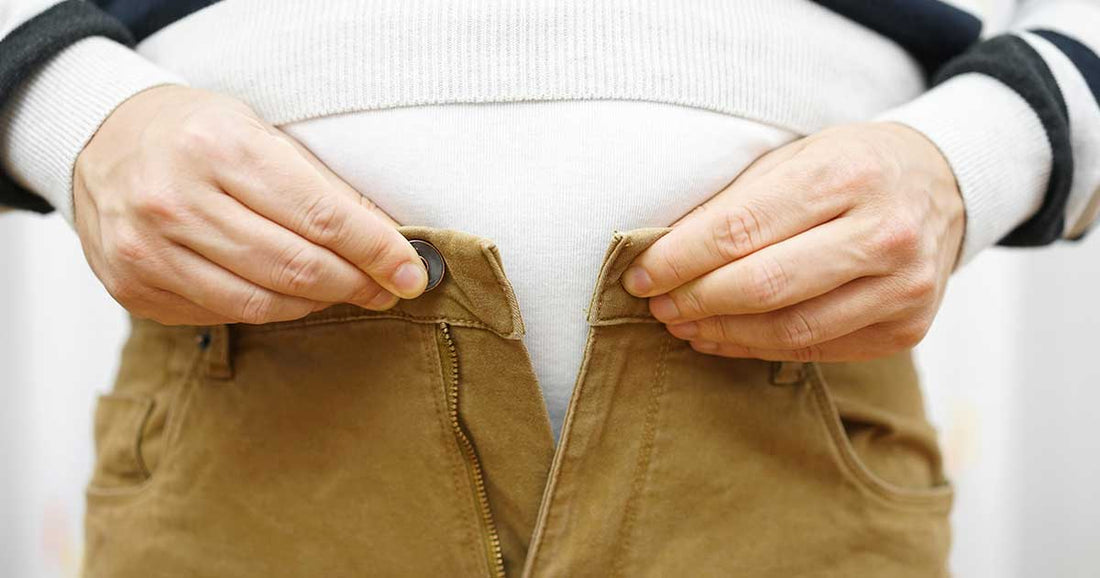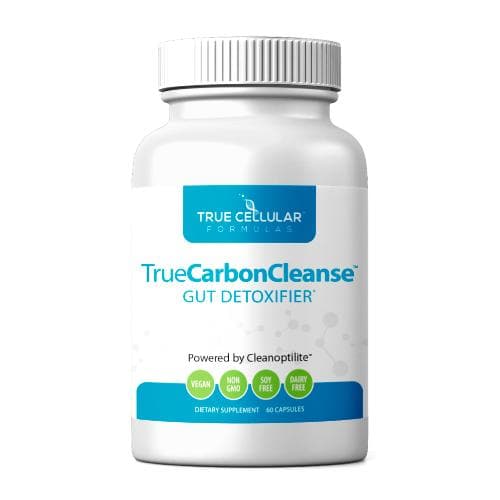Top 5 Tips For Avoiding Holiday Weight Gain

Share
One of the biggest concerns about the holidays is gaining unwanted weight. This article will discuss how to enjoy the holiday season without packing on the pounds.
Tip #1: Drink Plenty of Water
Water is believed to ease feelings of hunger, decreasing the chance of overeating. Drinking two glasses of water during a meal has been shown to impact feelings of hunger and fullness.[1]
In addition, studies indicate feelings of hunger and fullness come from the gut. As a result, there may be a delay in feelings of fullness when eating. On the other hand, liquids can be consumed much quicker than food, which could trigger feelings of fullness faster than eating.[2]
Consuming water might be one of the easiest ways to decrease the risk of weight gain. Consider drinking a glass or 2 of water before eating this holiday season.
Tip #2: Stay Physically Active
Staying physically active during the holiday season may help curb weight gain. In addition to weight loss, physical activity, and exercise are believed to help reduce the risk of poor heart health.[3]
Health guidelines suggest that individuals get 150 minutes of moderate or 75 minutes of vigorous exercise per week. Here are examples of both types of exercises:
|
Moderate Exercise Examples |
Vigorous Physical Exercise Examples |
|
Mopping/sweeping/vacuuming |
High-Intensity Interval Training (HIIT) |
|
Water aerobics |
Calisthenics (lunges, pushups, sit-ups, etc.) |
|
Biking (slower than ten mph) |
Skipping rope |
|
Gardening |
Aerobics |
|
Dancing |
Roller-skating |
|
Bowling |
Racquetball |
|
Walking/jogging |
Shoveling snow |
To help decrease the risk of weight gain during the holiday season, increase your physical activity and spend fewer hours on the couch watching television or sitting in front of a computer.
Tip #3: Try Intermittent Fasting
Intermittent fasting is a diet strategy that consists of alternating eating and not eating periods. The premise is that fewer calories are consumed over time, which could increase the probability of weight loss.
An example of intermittent fasting is eating a healthy dinner and not eating until lunchtime. Drinking water during the fast is vital and may help increase feelings of fullness (as discussed above). Studies on intermittent fasting have shown it to help reduce body weight and waist circumference.[4]
Another form of intermittent fasting is alternate-day fasting (ADF), where a fast is performed every other day, and a normal diet Is consumed on non-fasting days. When compared to intermittent fasting, ADF was shown to have the greatest impact on weight loss.[4]
When indulging at the company holiday party, consider trying an alternate day fast the next day.
Another option is to exercise in the morning before eating. This may prompt the body to burn additional calories, which could help with weight loss. High-Intensity Interval Training (HIIT) consists of short but intense bouts of exercise that can last 10-30 minutes. A combination of HIIT and intermittent fasting was found to have a positive effect on the body composition of overweight and obese adults.[5]
Note: Those on medication or preexisting conditions should consult with a physician before attempting an intermittent fast.
Tip #4: Keep Stress Levels in Check (Avoid Stress Eating)
Holiday stress can be defined as the pressure often experienced during the holiday season. There are several potential causes of holiday stress, including the following:
- Gift-giving (financial pressures)
- Unhappy memories
- Missing loved ones
- Attending social gatherings
- Unrealistic pressures
Studies indicate stress could manifest itself in many ways that might impact weight:[6]
- Prompts overeating and the consumption of “comfort foods,” which are typically high in fat, calories, or sugar.
- Decreased physical activity
- Shortened sleep
In addition, stress may disrupt the production of leptin and ghrelin, hormones that activate feelings of hunger and fullness.[6]
A poll from the American Psychiatric Association reports that 31% of adults expected to feel more stress in the 2022 holiday season compared to 2021 (a 9% increase).
Here are a few popular ways to limit holiday stress:
- Take a break from social media. Don’t compare your situation to others.
- Reduce feelings of loneliness. Spend quality time with family or friends.
- Exercise daily. Physical activity could help reduce feelings of stress.
- Identify stress triggers. Discover what causes your holiday stress and implement plans to deal with it before they are triggered.
- Increase stress-relieving activities. Meditation, reading, yoga, laughter, jigsaw puzzles, volunteering at charities, etc. are popular stress-relieving activities.
- Seek help from a professional. Talk to a professional if feelings of stress or anxiety become overwhelming.
Tip #5: Avoid Late Night Snacks
Eating large portions of food later in the day and into the night has been associated with higher body weight and might hinder weight loss efforts. A key factor is the type of foods consumed. Foods with sugar and artificial ingredients may hurt sleep patterns and metabolic health.[7] This holiday season, try to avoid eating after a certain time.
Supplements for Holiday Weight Gain
In addition to the tips listed above, the following supplements may help maintain good health during the holidays.
TrueCarbonCleanse™ - Gut Detoxifier 
During the holiday season, we might eat foods we wouldn’t normally consume.TrueCarbonCleanse™ - Gut Detoxifier supports the body’s natural removal of toxins and other harmful particles from the body. This product attracts toxins released from the colon and prevents them from being reabsorbed into the body (aka retoxification).
TrueCarbonCleanse™ - Gut Detoxifier contains powerful, all-natural ingredients that bind to toxins and remove them from the body naturally, including activated charcoal, the patent-pending Cleanoptilite™️, magnesium dioxide, and apple fiber.
ION* For Gut Health 
ION* For Gut Health is an all-natural mineral supplement derived from fertile, healthy soil supporting the gut microbiome. Its active ingredient is Terrahydrite®, a mineral in the soil that helps maintain the strength and integrity of the gut linings. This could be beneficial when consuming various foods that contain the following:
- Sugar
- Fat
- Gluten
- GMO’s
- Herbicides and pesticides
- Antibiotics
Summary
The holidays are a festive time of year spent with family, friends, and loved ones. It is also a time when many gain a few extra pounds. Are you concerned with gaining weight this holiday season? Try these tips and share your experiences with us in the comments below.
References:
- R Lappalainen 1, L Mennen, L van Weert, H Mykkänen. Drinking water with a meal: a simple method of coping with feelings of hunger, satiety and desire to eat. Eur J Clin Nutr. 1993 Nov;47(11):815-9. [ PMID: 8287852].https://pubmed.ncbi.nlm.nih.gov/8287852/
- Vineet Augustine, Sangjun Lee, Yuki Oka. Neural Control and Modulation of Thirst, Sodium Appetite, and Hunger. Cell. 2020 Jan 9;180(1):25-32. doi: 10.1016/j.cell.2019.11.040. PMID: 31923398; PMCID: PMC7406138.https://www.ncbi.nlm.nih.gov/pmc/articles/PMC7406138/
- Damon L Swift 1, Joshua E McGee 2, Conrad P Earnest, (et al). The Effects of Exercise and Physical Activity on Weight Loss and Maintenance. Prog Cardiovasc Dis. 2018 Jul-Aug;61(2):206-213. doi: 10.1016/j.pcad.2018.07.014. Epub 2018 Jul 9. [PMID: 30003901].https://pubmed.ncbi.nlm.nih.gov/30003901/
- Sek Ying Chair 1, Hua Cai 2, Xi Cao, (et al). Intermittent Fasting in Weight Loss and Cardiometabolic Risk Reduction: A Randomized Controlled Trial. J Nurs Res. 2022 Feb 1;30(1):e185. doi: 10.1097/jnr.0000000000000469. [PMID: 35050952].https://pubmed.ncbi.nlm.nih.gov/35050952/
- Zhicheng Guo, Jianguang Cai, Ziqiang Wu (et al).Effect of High-Intensity Interval Training Combined with Fasting in the Treatment of Overweight and Obese Adults: A Systematic Review and Meta-Analysis. Int J Environ Res Public Health. 2022 Apr; 19(8): 4638. Published online 2022 Apr 12. doi: 10.3390/ijerph19084638. [ PMID: 35457507].https://www.ncbi.nlm.nih.gov/pmc/articles/PMC9030367/
- A Janet Tomiyama. Stress and Obesity. Annu Rev Psychol. 2019 Jan 4:70:703-718. doi: 10.1146/annurev-psych-010418-102936. Epub 2018 Jun 21. [PMID: 29927688].https://pubmed.ncbi.nlm.nih.gov/29927688/
- Annette Gallant, Jennifer Lundgren, Vicky Drapeau. Nutritional Aspects of Late Eating and Night Eating. Curr Obes Rep. 2014 Mar;3(1):101-7. doi: 10.1007/s13679-013-0081-8. [PMID: 26626471]. https://pubmed.ncbi.nlm.nih.gov/26626471/
